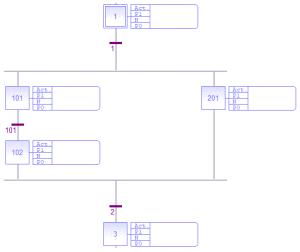SFC Execution at Runtime
- A parent SFC program is executed before its children.
- This implies that when a parent starts or stops a child, the corresponding actions in the child program are performed during the same cycle.
- In a chart, all valid transitions are evaluated first and then actions of active steps are performed.
- The chart is evaluated from the left to the right and from the top to the bottom.
Example
|
Execution order:
|
The initial steps define the initial status of the program when it is started.
- All top level (main) programs are started when the application starts.
- Child programs are explicitly started from action blocks within the parent programs.
The evaluation of transitions leads to changes of active steps, according to these rules:
- A transition is crossed if:
- Its condition is TRUE and all steps linked to the top of the transition (before) are active.
- When a transition is crossed:
- All steps linked to the top of the transition (before) are deactivated.
- All steps linked to the bottom of the transition (after) are activated.
Divergence
- All conditions are considered as exclusive, according to a left-to-right priority order.
- It means a transition is considered as FALSE if at least one of the transitions connected to the same divergence on its left side is TRUE.
Order of Action Block Execution
For a given cycle, if a transition is:
- FALSE, the N-action blocks are evaluated for all active steps waiting on that transition.
- TRUE, the P0 action blocks are evaluated for all active steps waiting on that transition, followed by the P1 and N steps for all steps waiting on that transition.
- The steps that were waiting on that transition are then marked as active.
Example
Using this SFC:
The order of action block execution for a given cycle is:
|
Incoming State |
Evaluating Transition |
If Transition is FALSE |
If Transition is TRUE |
|---|---|---|---|
|
First Cycle |
N/A |
[1] P1 [1] N |
|
|
Transition 1. Not yet TRUE. |
Transition 1 |
[1] N |
[1] P0 [101] P1 [101] N [201] P1 [201] N |
|
Passed transition 1. Transition 101 not yet TRUE. |
Transition 101 |
[101] N [201] N |
[101] P0 [201] N [102] P1 [102] N |
|
Passed transitions 1 and 101 Transition 2 not yet TRUE. |
Transition 2 |
[201] N [102] N |
[201] P0 [102] P0 [3] P1 [3] N |
-
-
Execution of SFC in the IEC 61131-3 target is sampled according to the target cycles.
When a transition is crossed within a cycle, these steps are activated.
The evaluation of the chart continues in the next cycle.
If several consecutive transitions are TRUE within a branch, only one of them is crossed within one target cycle.
-
-
Some runtime systems may not support exclusivity of the transitions within an divergence.
See the OEM instructions for more information about SFC support.







